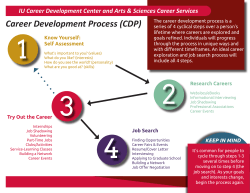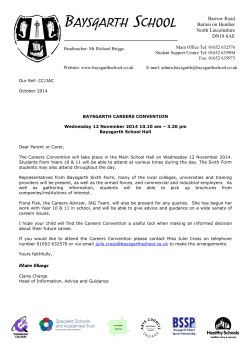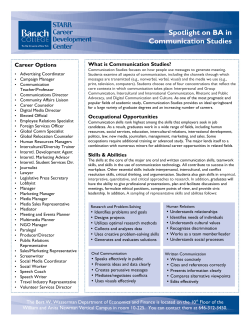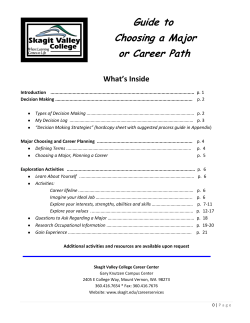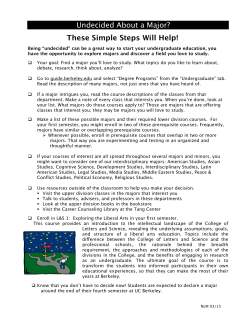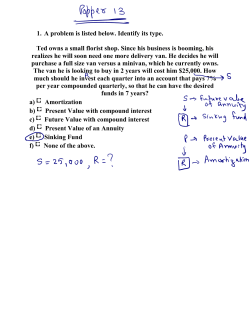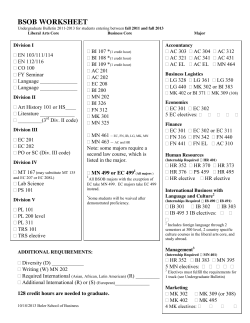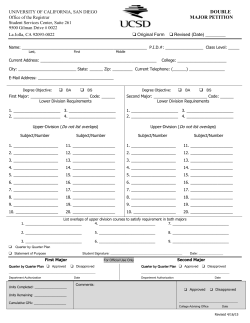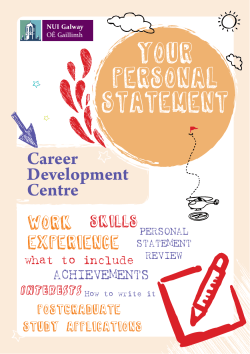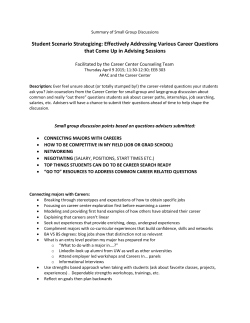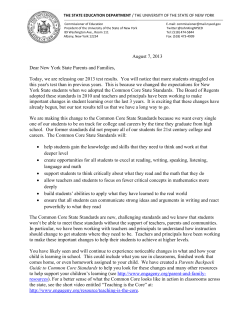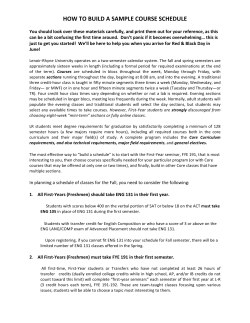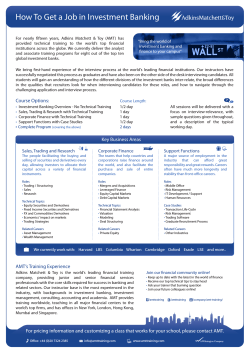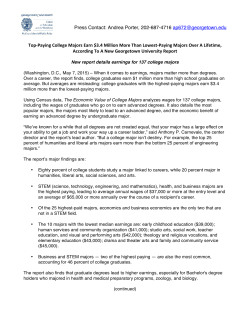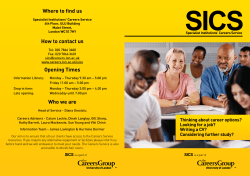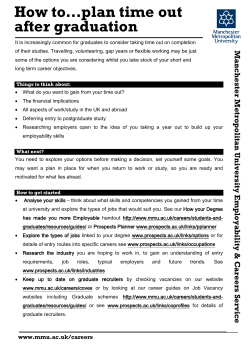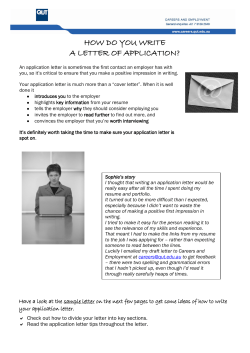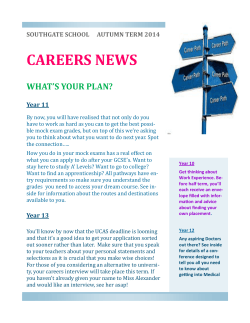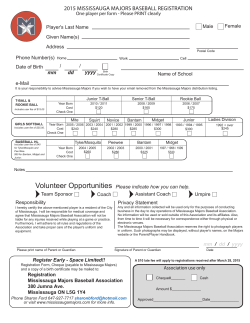
Choosing a Major Planning Your Future
Choosing a Major Planning Your Future Some misperceptions about majors 1. The best way to find out about a major is to take courses in it. 2. I should get my GE’s out of the way first. 3. Picking a major and picking a career are the same thing. 4. Choosing one major means I have to give up all others. 5. My major will determine what I do for the rest of my life. 1. Take courses in it (um, not required) • An introductory course usually will NOT give you a good idea of what the major is like – it is often too general • Sometimes you can’t get into ‘major’ courses until your junior year • If you use this technique, your ‘process of elimination’ will take too long - - - - - Look through the required textbooks, read the course description, ask questions of the department 2. Finish GE’s first (please don’t) • You could complete all the GE courses for one major and find out that some of them won’t count for other majors • If you end up choosing a challenging major and you have already completed your GE’s, your schedule will be comprised of major classes only, and that can be a heavy load - - - - - Mix up your class schedule so that you are taking a variety of courses 3. Pick a major, pick a career (not really) • Except for very specialized professional majors (like nursing, engineering, social work and nutrition) choosing a major does not limit you to just one career choice • Some careers, like law and medicine, do not require that the undergrad degree be in a particular major - - - - - The former head of the Federal Reserve, Alan Greenspan, did not major in economics, he majored in music! Sometimes it’s enough to get a good, well-rounded education, and the talented and motivated will take it from there! 4. Choosing one major excludes all others (not even) • You can combine interests by undertaking a double major • You can minor in something • You can get a certificate in something else • You can take classes just because you are interested – not because you plan a career in it! - - - - - It’s not unusual for students to change their majors, sometimes more than once! Just be aware that the longer it takes for you to decide on a major, the longer you will be in school(and paying tuition). 5. My major – my life (probably not) • The typical American has at least 3 different careers in his/her lifetime (and 15 +jobs!) It is likely that not all of those careers or jobs necessarily relate directly to the college major. • Some majors (Philosophy and Theatre come to mind) don’t relate to many careers per se, BUT the skills acquired (critical thinking, effective communication) can be applied to many career fields - - - - - Choosing your major is an important decision, but it is not absolutely crucial to your future success. Reasons for choosing a major The Wrong Reasons • “My parents want me to study this.” • “My friends are in this major.” • “This major will lead to a career in which I’ll make buckets of money.” • “Frankly, I’m too lazy to research this, so I’ll just choose something!” The Right Reasons • “I really love studying this field – in fact, I even read about it in my spare time.” • “Pursuing this major seems right to me – I feel that it is a part of who I am.” • “I have many interests, but after doing my research, I think this is the best major for me.” How do I choose a major? Do a self-analysis Do your career research Self-Analysis • • • • Interests Personality Skills Values Interests (those things you love doing) The Strong Interest Inventory (SSI) test divides workers into 6 categories, called the RIASEC scale. • Realistic “doers” have mechanical &/or athletic abilities; enjoy building; prefer concrete problems & working outdoors • Investigative “thinkers” are people who love analyzing things: they observe, learn, evaluate, solve problems. Prefer to work alone, are often inventive. • Artistic people are the “creators” with innovative or intuitional abilities. Like unstructured situations, use their imagination, need to express themselves, are often emotional & sensitive. • Social people are the “helpers:” they like to train, assist, inform & cure others. Like working in groups, have good communication skills, are friendly & empathetic. Interests (those things you love doing) • Enterprising people are “persuaders” who enjoy influencing, managing & leading others, often for economic gain. Energetic, ambitious: often into status & power. • Conventional people are the “organizers” who like working with data & details; have clerical & numerical abilities, are efficient & dependable. Most people see themselves in 2 or 3 of these different interest categories. Personality (the way you’ve always been – since birth!) • The Myers-Briggs test (MBTI -available to all students) categorizes test-takers into one of 16 personality types. • The major components of personality include these dynamics: • Are you an introvert or an extrovert? • Are you realistic, working in the ‘here & now,” or are you able to see ‘the big picture’ and come up with creative ideas? • Do you make logical, analytical decisions, or are you often influenced by feelings? • Do you prefer a planned & orderly way of doing things, or do you like to be spontaneous & flexible? Skills (those things you’re good at) • Skills & interests may overlap, because things you are good at are usually enjoyable. • Skills are talents. They are not necessarily innate. They can be learned, acquired or improved with practice. More on skills Types of skills 1. Self-management skills. These are personal traits or qualities, like: how you get along w/others how you adapt to an environment how you respond to authority how you manage & maintain yourself 2. Function skills: things you do. Can you fix things, can you write well, can you organize an event? These skills can be used in a number of different careers. 3. Work-content skills require training in a particular field. Examples: taking blood samples, throwing a curveball, creating a website, cooking an elaborate dinner. Another way of looking at skills – 3 major groups of skills • PEOPLE skills (serving, helping, speaking, taking instructions, supervising, negotiating, mentoring) • DATA skills (comparing, compiling, computing, analyzing, coordinating, innovating, synthesizing) • THINGS skills (handling, tending, setting up, manipulating, operating, controlling) What do you value? Values are developed early in life and are motivators that indicate what is important to you. • Personal & family values • Cultural values • Economic values Career Research • Research Resources • Informational Interviews • Job Shadowing, Volunteering, Practical Work Experience Research Resources Books Available in the CDC library, as well as local libraries: • The Encyclopedia of Careers & Vocational Guidance (4 volumes) • Guide to College Majors • Book of College Majors • Various major-specific titles Online • “What can I do with this major?” is on the CDC website main page • www.bls.gov/oco awesome site for info on hundreds of careers • Choices – available on the desktops in the CDC Informational Interviews • Who knows careers better than the people working in them? Interview those people! • • • Start by asking family, friends, alumni, acquaintances who are working in a field of interest to you. Preferably in person, speak to them about their career. You are interviewing for information, not a job. For suggested interview questions, go to: www.calstatela.edu/univ/cdc/doc/infointer views.pdf Q&A Job Shadowing, Volunteering • Job shadowing allows you to observe professionals on the job and get insight into the practical side of a particular career. • The people who grant you informational interviews may be willing to let you shadow them. • Certain employers, like hospitals, schools, police departments and non-profit organizations are often happy to have volunteers. Volunteering gets you exposed to different work environments. Practical Work Experience • Every job is a learning experience no matter what your job is, or whether or not it relates to fields you might want to study. WHY? If nothing else, it might tell you what kind of work you’d never want to do professionally. But more importantly, it gets you in a real work environment in which you can observe your bosses, study the business, and show personal responsibility……It’s also something to put on your resume! SUMMARY • Reflect on your interests, skills, personality and values • Consider taking the MBTI and SSI test assessments • Do your research on majors and careers using both library and online resources • Conduct some informational interviews, job shadow, volunteer, & get some practical work experience • Understand that choosing a major and, subsequently, a career, is an ongoing process that may involve ‘do-overs’ • Choose a major for the right reasons For counseling, testing, free workshops & other career-related action, visit us! (323)343-3237 www.calstatela.edu/careercenter CAREER DEVELOPMENT CENTER ASPIRE – ACT - ACHIEVE
© Copyright 2025
